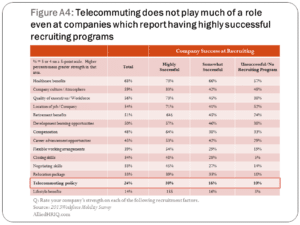(Editor’s Note: Today’s post is brought to you by Allied Van Lines®, a leader in the moving and storage industry with more than 75 years of experience. For a second year, they are championing a research project, Allied HRIQ, aimed to provide business professionals with data on current workforce trends. I’m honored to be working with Allied again and hope you find the information interesting.)
A few months ago, Yahoo! President and CEO Marissa Mayer banned telecommuting. The response uproar backlash was swift. Experts from everywhere said telecommuting is essential to employee satisfaction and engagement. Some said this was the first sign of the apocalypse. All right – you caught me. No one really said that … but you would have thought the world was coming to an end given all the media attention.
Let me toss an idea out there. Maybe telecommuting isn’t the utopia we think it is. Or that it’s been hyped up to be.
By definition, telecommuting is when employees do not travel to a central place of work. Telecommuting is also referred to as telework or remote work. Typically when a person telecommutes, they’re working from home. So chances are, they have a home office. Although there are some telecommuters who work from airports and coffee shops.
This is different than flexible work (aka flextime). Flexible work is when employees have the ability to adjust their work hours. There might be some core hours that everyone is required to be in the office. That’s probably driven by operational needs. But there are hours that employees can “flex” to accommodate traffic, parenting responsibilities, caregiving duties, etc.
I must admit there have been times when I’ve used the terms telecommuting, telework, flexwork, etc. interchangeably. But the terms are very different and this year’s Allied HRIQ research shares some interesting findings where recruiting, telecommuting, and flexible work are concerned.
In looking at the chart above it will be no surprise that corporate culture, management and leadership, and professional development were high on the list. Healthcare was rated number one – which I find surprising. Companies feel they have more strength in their healthcare package than with the quality of senior leadership.
But the thing that caught my eye was telecommuting rated pretty low on the list. Given the reaction to the Mayer decision, I expected telecommuting to be higher. Interesting note: flexible working arrangements was several places above telecommuting.
Then it occurred to me. Telecommuting is about working from home. As someone who currently works from home, I’ll confess – it can be tough. Work is always staring you in the face. You have to learn how to deal with it. If employees aren’t able to figure out how to create balance when they live and work in the same place, it can be a detriment to productivity and employee morale.
On the other hand, it’s impossible to shut off our personal lives when we arrive at work. Employees do have outside commitments and obligations. Having flexible work arrangements give employees the ability to deal with all the other things in their lives and still get their work done in an office environment. And they don’t necessarily need a home office. So work doesn’t need to stare them in the face every evening.
I’m certainly not saying that companies with telecommuting programs should toss them out the window. Allied HRIQ’s research reminded me that telecommuting isn’t necessarily an employee engagement Shangri-La. Just because it works for one company or one individual doesn’t mean it will work for everyone. Some organizations may find other options, like flexible work, bring better results and employees like it more.
My takeaway from Allied’s data is the importance of feedback.
- Ask new hires what it was about the company that sold them.
- Find out from current employees what keeps them coming to work every day.
- Include a question in exit interviews about which benefits and programs the employee enjoyed.
Creating a feedback mechanism will allow companies to determine which programs work best for their culture and their employees.
There’s lots more interesting reading in the Allied HRIQ research. I encourage you to check it out by visiting their website, connecting with their LinkedIn group, or following them on Twitter. Also, be on the lookout for more Allied HRIQ insights from my HR blogger compadres Steve Boese, Kris Dunn and Trish McFarlane.








Steve MacDonald says
Great post Sharlyn! I strongly agree that every company should have a feedback mechanism in order to determine and provide a better relationship with the employees.
Geffrey says
I have been working here at our company for almost 2 years with a flexible time. This is one reason why I love to work here so much. Unlike when I first work as an engineer at a ship building company, they do have a telecommuting service. But the work is 10 hours a day, 6 to 7 days a week. That’s a rage quit for me.
Gina says
I agree that a feedback mechanism is a necessity. Employers should really do a pulse check with employees prior to doing away with programs like telecommuting, to determine if these programs are what keeps employees happy.
My company has a telecommuting policy in effect however the management of our department has decided to do away with this benefit for our employees, without such a pulse check. Doing away with this benefit for our department, combined with no raises, bonuses or awards for the last couple of years has led to the resignation of several team members in the two weeks since the benefit was taken away. In their meetings with management, the employees cited telecommuting as the one benefit that kept them with the company.
Sharlyn Lauby says
Thanks for the comments! The conversation about telecommuting and flexible work has been fascinating. Both companies and employees have their preferences. The key to success is communication, communication…and more communication.
Philippe Picard says
Your article was an interesting read, but I think it paints an incomplete picture.
You completely omitted to take into account the most important aspect of the Yahoo story: Yahoo is a Silicon Valley tech company.
Programming lends itself very well to telecommuting and programmers tend to like working from home, where they are most comfortable and free from the distractions and interruptions of the standard workplace.
Many programmers are creative types who work better on their own terms.
Maybe telecommuting is not high on the list of priorities for say, an accountant or a Customer Seervice clerk, but for programmers, it is huge.
Sharlyn Lauby says
Hi Philippe. Thanks for the comment. Totally agree – Yahoo is a different company. And there’s been more than enough written about them regarding telecommuting. But their decision to eliminate it raised a great question about what employees really want. The Allied HRIQ research does a good job of speaking to the larger question.
Michelle says
Thanks for sharing!
I know that for every employee this list of priorities would be different. I personally would have telecommuting higher on my list vs. healthcare because I am covered through my husband’s insurance. I believe it all has to do with the culture of the organization as well as the type of work you do. Some job functions require you to be in the office location. If you can’t do that then maybe that job isn’t for you.
Craig Smith says
Great article, I carried out a thesis (in 1999!) on this exact subject & there also needs to be an employee profiling / health analysis in terms of the preparedness of that employee with respect to:
1. Distinguishing work vs home life & being disciplined to clearly differentiate the two without compromising family life,
2. The impact of their social requirement and that telecommuting has potentially dangerous repercussions on an employee’s state of well-being if not managed correctly.
It is great to see that this topic is still debated & certainly has its merits & definite organisational benefit, with employee support programming & effective communication.
Sharlyn Lauby says
@Michelle – Thanks for the comment. Hope you’re doing well. I expected telecommuting to be higher on the list as well.
@Craig – Thanks for sharing!
Catie Farrow says
Definitely agree that feedback should be a part of the equation when weighing the pros and cons of telecommuting and flexible work. It’s important to keep employees engaged with the work and with the company, and keeping an open and transparent dialogue with the team is paramount to keeping employees happy. However, we have to keep business results in mind and the managing of the work – not just the people. I have to feel sympathetic for Mayer given the incredible amount of work she faced when she joined Yahoo! to bring the company up to speed with the rest of the industry. In her case, it seems she had to shake things up to achieve the business results the company desperately needed. Of course, a major change like that requires the buy-in of committed employees, and, as you say, feedback and transparency are necessary components in achieving this. I’ll be interested to see how this situation for Mayer in the long-run. Thanks for your insights, as usual!
Sharlyn Lauby says
Thanks Catie. Totally agree – we have to weigh business results with employee wants/needs. The best decisions are the ones that accomplish both.
Joe Carbone says
I have really appreciated the flexible work schedule and telework options I have and I like that I can offer that to employees I supervise. More and more I notice an expectation that my organization has a goal to increase telework and there are more and more requirements around telework. There is a push for scheduled telework so we can reduce the number of desks in the office that are occupied at one time. While I appreciate being able to work from home when it helps balance my home-life and helps me focus on my work, I need flexibility to be effective with it all and a big part of my job is connecting with people face-to-face at the office.
Kathy says
When telecommuting is an option – for software work, say – and you don’t minimally offer it on those days when the weather is bad and the highway department asks people to stay home, it’s a deal breaker in terms of engagement. It says for the company, “My need to mistrust your work ethic trumps your need for safety.” True, in cases of exempt employees (software people are usually exempt) it’s just a matter of letting them stay home and docking vacation . But when dedicated staff members are demonstrating their loyalty by working at home even as they lose vacation days, that does not say good things for the company. Lack of telecommute in that circumstance might not help hiring but it does tempt the existing stars away.
Sharlyn Lauby says
@Joe – Thanks for sharing. Flexibility can be a great benefit for employees. If they’re given the tools to be successful. And they want it.
@Kathy – You raise an excellent point. Even if a company doesn’t want to offer a regular telecommuting option, on inclement weather days…it is a good way to keep productivity at a high level.
david k waltz says
Sharlyn,
Telecommuting does not necessarily mean ‘home’, does it? If I need to check emails or devote 2-3 hours of highly focused analysis or reading time, I find a coffee shop or the library often better than home for some of the reasons you address in this post.